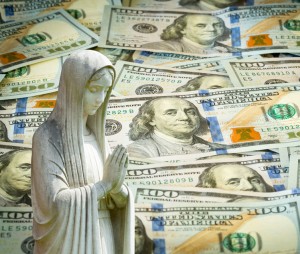Holy Rolling in It Preachers Who Violate IRS Rules while Living Large Should Be Audited

The recent news that the economic value of religion to the United States may be between $1.2 trillion and $4.8 trillion annually surprised many. The lower figure would place the religious industry as the fifteenth largest economy worldwide, with the higher figure placing it third, just below the gross domestic product of the United States and China, but above economic powerhouse Japan. According to a Georgetown study, the estimates are comprised of “healthcare facilities, schools, daycare, and charities; media; businesses with faith backgrounds; the kosher and halal food markets; social and philanthropic programs; and staff and overheads for congregations.”
With the growing influence of the religious right in America and their firm grasp over the Republican Party, many Americans are becoming increasingly concerned over churches involvement in politics.
One of the more tangible arguments against this massive industry is the distaste for the lavish lifestyles that some preachers lead. The likes of Creflo Dollar, Kenneth Copeland, and Mike Murdock are easy targets, with Dollar famously asking his congregation for $65 million so that he could purchase a new private jet, Copeland encouraging Bonnie Parker to sew money seeds in Kenneth Copeland’s church instead of seeking medical assistance, and Murdock boasting to his congregation that he bought a private jet in cash, later explaining that due to the jealousy of his congregation, he bought another jet, “three times more expensive, cash.”
The “prosperity gospel” that these individuals preach is an abhorrent aim at collecting money from the vulnerable to further religious leaders’ expensive tastes under the guise of a tax-free haven, while living in untaxable homes called parsonages. The IRS does not allow for the residences of clergy to be taxed, allowing for ministers like Copeland to live in a mansion (with an attached airport) while avoiding the burden of taxation. Creflo Dollar owns various multimillion dollar mansions around the United States, from California to Georgia to New York, but the point becomes redundant. Their victims are low-hanging fruit—many “prosperity gospel” preachers deftly use their status to avoid taxation, all while encouraging the vulnerable to part with what little money they have in a false pretense that heaven beckons.
While individuals like Dollar, Copeland, and Murdock act appallingly, the problem lies in the system. While these “profit parishes” are corrupt in their own sense, taking advantage of vulnerable individuals without the means to pay, organized churches often subvert the law in their own way—politicking from the pulpit.
The IRS specifically states that churches and nonprofits are forbidden from intervening “in political campaigns,” forbidden from “attempting to influence legislation,” while being unable to “participate in, or intervene in, any political campaign on behalf of (or in opposition to) any candidate for public office.” Any violation of these tenets should, hypothetically, result in the termination of that tax-exemption status. This legislation, known as the Johnson Amendment, was intended to enforce a separation of church and state that has gone awry in recent years.
On Mike Huckabee’s Fox News program in 2014, he welcomed Pastor Jim Garland to share his feelings on the Johnson Amendment, stating that the IRS had “specifically targeted” churches to stop them from espousing political rhetoric. Garland had the audacity to state that churches do not want “governmental intrusion” in church life, forgetting that churches are free to preach politics as much as they want, but will face the consequence of losing their free ride and their tax-exempt status from the government.
However, in the most shocking claim, Garland stated that during “Pulpit Freedom Sunday,” over two-thousand sermons were sent to the IRS containing political rhetoric, in direct violation of the Johnson Amendment and IRS regulation. Garland triumphantly announced that “in the sixty years of the Johnson Amendment, there has not been one church that has lost its tax-exempt status.” The IRS has failed in its duty to the American people to audit these churches.
If churches were to pay their fair share of taxes, there would be an influx of $71 billion per year for the government to repartition. With America’s crumbling infrastructure, receiving a D+ grade thanks to its “third-world” airports, poor roads, and school facilities, you wonder about the effect that additional $71 billion would have on these inadequacies that will cost our economy trillions of dollars over the coming years. Additionally, with our education system sliding further down the rankings (35th in mathematics below Russia and Slovakia, 27th in science below Latvia), you wonder if this massive sum of money could result in a generation of educated students who do not believe that the earth is six-thousand years old, or that evolution or climate change are “only” theories.
Now, I am not actually advocating for the taxation of churches, as nonprofits that do great work will consequently suffer, and, as someone who’s worked for several non-denominational nonprofits, there are many deserving, hardworking, and wonderful people who would be negatively impacted. However, I do believe that the “prosperity gospel” churches should be illegal. The consistent exploitation of the vulnerable allows celebrity pastors to further their lavish lifestyles, all while asking for more money rather than giving it out, in direct opposition to Matthew 10:8, where Jesus states “give as freely as you have received.” Churches and religious groups also need to be held to a higher degree of accountability by the IRS. In auditing zero of the pastors and parishes that have provided the IRS with evidence of their violation of the Johnson Amendment, the IRS has failed to maintain a separation of church and state.
